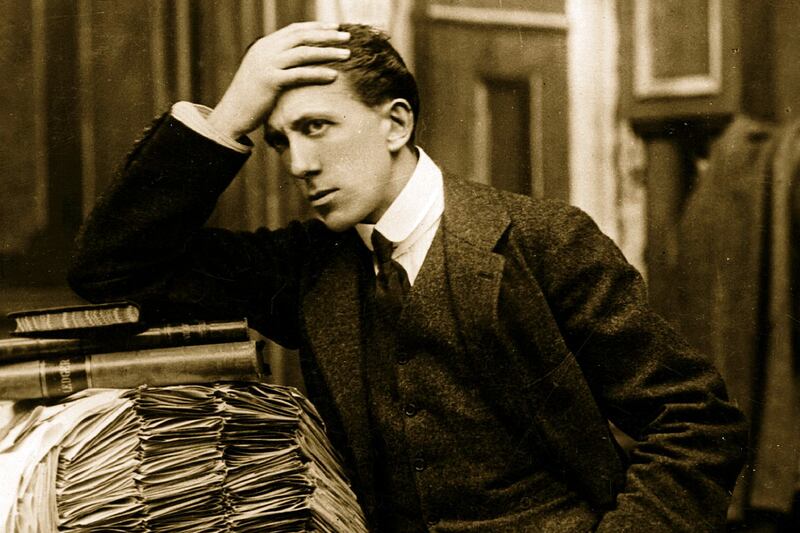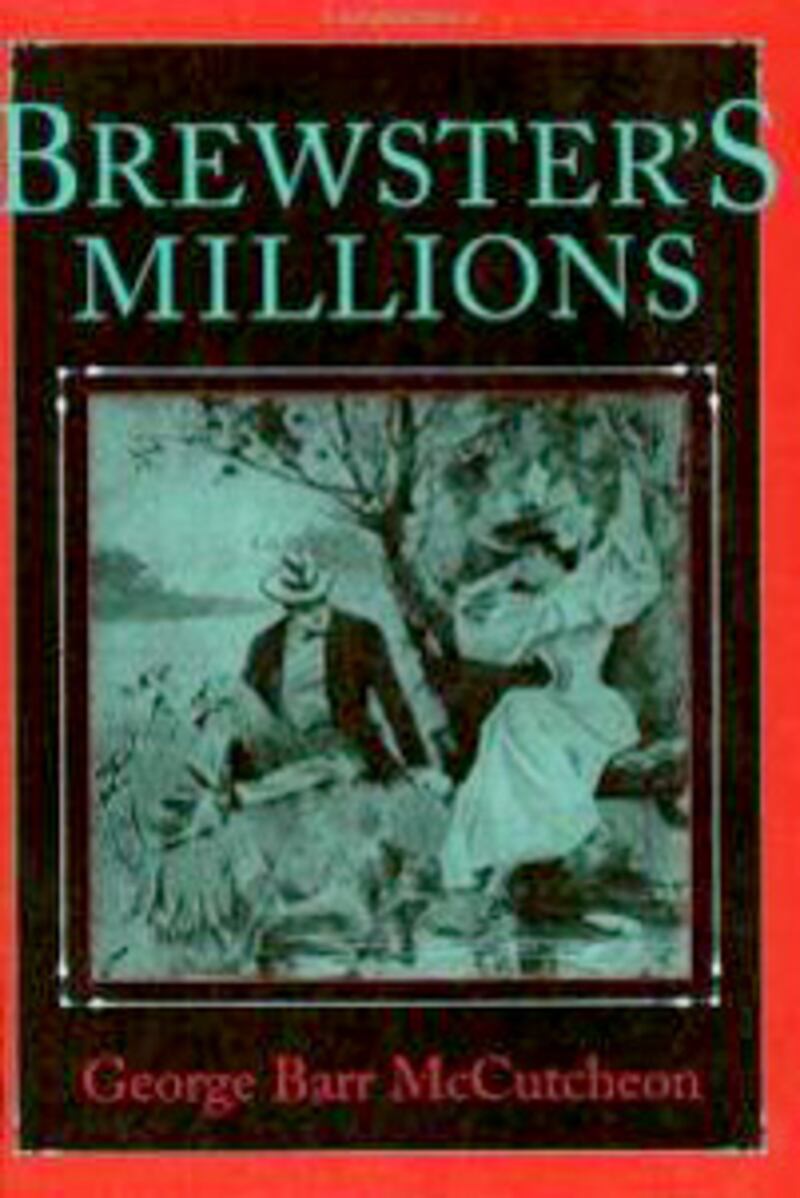1902: Brewster’s Millions by George Barr McCutcheon

Brewster’s Millions, a novel about a bet, was written on a bet. George Barr McCutcheon was visiting his publisher when the subject of bestselling novels came up in conversation.
“The name of the author is what sells the book,” remarked the publisher.
McCutcheon, who the previous year had written his first bestseller—the initial volume in the Graustark series of romantic adventure novels—disagreed.
“I will bet you $100 that it does,” said the publisher.
“I will take that bet,” replied McCutcheon, “and I will write you a story to show you that I am right.”
Six weeks later McCutcheon submitted a manuscript. It was the story of a young man named Monty Brewster who, in order to inherit $7 million, must spend $1 million in a single year. There are, however, strings attached. At the end of the year Monty cannot possess any assets; he is forbidden from telling anybody why he’s spending all his money; and he may only donate a piddling amount to charity. Monty is free to reject the challenge and keep the $1 million, but he accepts the bet without hesitation. He begins his year of spending dangerously by renting the most expensive apartment in Manhattan and leasing four Monets, three cars, two horses, and a chef from Paris.
McCutcheon, needless to say, won his publisher’s bet—in fact he made off nearly as well as Monty Brewster. Brewster’s Millions sold 150,000 copies in its first three months of publication, despite the fact that the author was listed as “Richard Greaves.” (A clerk at the publishing house posed for the press photo.) The novel remains in print 110 years later, and has been adapted for film at least 10 times.
It is the classic riches-to-rags tale. Most of the humor derives from Monty’s grim determination to hemorrhage cash. He takes no pleasure in the stuff money can buy, and flies into a rage whenever a well-meaning employee tries to reduce costs—buying dahlias instead of orchids, say, or apple cider instead of champagne. A reverse Murphy’s Law soon takes effect: anything that can go right, goes right. Monty bets recklessly at a Monte Carlo roulette wheel, but the croupier keeps calling his number; the long-shot horse wins at the racetrack; a sucker wins a prizefight by knockout. In a prescient demonstration of game theory, Monty invests heavily in a freefalling stock, only to see it rise sharply when the size of his investment attracts interest. But gradually Monty’s luck improves. A $3,000 glass ceiling falls and shatters during a dinner party (“Thank the lord!” he mumbles under his breath, as his guests scream). He crashes his car into a subway excavation, injuring three workmen whose medical fees he must cover. And he is mugged while walking at night. When the thieves miss a roll of bills in his overcoat’s inner pocket, Monty begs them to return. “You chaps are very careless,” he scolds them, offering them the extra cash.

The novel flags only when McCutcheon strays from Monty’s obsessive pursuit of poverty. In a tepid romantic subplot, Monty strikes out with a rich society girl, but finds true love with the faithful, plain, and deeply priggish Peggy Gray. How priggish is Peggy? When Monty rents out La Scala in Milan for a private opera performance, she says, “Isn’t it a waste that no one else should have seen it? Think of these poverty-stricken peasants who adore music and have never heard an opera.” The next night Monty dutifully fills the opera house with poverty-stricken peasants. Fortunately he gets back to business the next day, sailing to Egypt, where he hosts a series of parties on his yacht that succeed “once again in fairly outdoing Aladdin.”
Brewster’s Millions reads at times like a parable, and for good reason. The novel was published during a revolutionary period in the country’s literary history. One hundred and twenty-five years after winning political independence from England, America had only just begun to liberate itself from the sovereignty of English literature. As late as 1895, the six best-selling novels of the year were written by British authors. The problem was legal as much as literary. Until Congress passed the International Copyright Act of 1891, American publishers could print English bestsellers at extremely low cost, because foreign authors weren’t entitled to the high royalties owed to American authors. Many houses even refused to consider American manuscripts for publication.
The new copyright law coincided with a growing sense of national self-consciousness, spurred by the Spanish-American War and incipient dreams of a global American empire. By the turn of the century, American novelists had rebuffed the Brits for good. “All at once,” wrote one contemporary critic, “America found that she was full of materials for fiction.” The historian Mark Sullivan described the dawn of a new literary consciousness: “The American reader came to realize there could be as much drama, and more verifiable truth, in the lives of his own neighbors, as in romances of English titled life.”
Brewster’s Millions does not make a clean break from the British country-house novel—it begins, in fact, as a romance of American titled life, with lords and dukes being replaced by railroad magnates, bank presidents, and owners of gold mines. The best way to squander a fortune, Monty soon realizes, is to enter Manhattan high society, and balls and dinner parties serve as convenient money pits. But in the second half of the novel this old world sensibility gives way to a new world triumphalism. Here Monty enacts a fantasy of benign American imperialism, touring Europe and Africa in his pleasure yacht. At each stop he is hailed as a conquering emperor. In the Riviera he presides over a parade and carnival. In Milan, when the crowds gather around him in awe, Monty explains to a friend, “They take us for American dukes and princesses.”
The most surprising thing about reading the novel today is its unquestioning endorsement of Monty’s campaign. We are always asked to take Monty’s side—the side of shrewd greed, of enlightened patronage. Wealth never corrupts, it only edifies. After all, it is Monty’s ability to dispose of his fortune that proves to his benefactor that he is a prudent businessman, and deserves the entire $7 million. By the end of the novel, the only thing that Monty has learned about money is how to spend it. But in 1902 the American century was a still innocent babe, and the great national myth—that any man might, with hard work and a touch of good luck, stumble into excessive wealth—could still be played without cynicism, for laughs.
Other notable American novels published in 1902:
Wings of the Dove by Henry JamesThe Life and Adventures of Santa Claus by L. Frank BaumThe Valley of Decision by Edith WhartonThe Two Vanrevels by Booth TarkingtonMary Johnston’s Audrey, the story of an orphan girl in Colonial Virginia, was the bestselling novel of the year.
This monthly series will chronicle the history of the American century as seen through the eyes of its novelists. The goal is to create a literary anatomy of the last century—or, to be precise, from 1900 to 2012. In each column I’ll write about a single novel and the year it was published. The novel may not be the bestselling book of the year, the most praised, or the most highly awarded—though awards do have a way of fixing an age’s conventional wisdom in aspic. The idea is to choose a novel that, looking back from a safe distance, seems most accurately, and eloquently, to speak for the time in which it was written. Other than that there are few rules. I won’t pick any stinkers.





